little 的用法
little的用法总结

little的用法总结一、关于“little”的基本含义和词性分类在英语中,单词“little”是一个常用且多功能的词汇。
作为形容词或副词,它有多个意义和用法,包括表示大小、数量、程度或时间的有限等。
除此之外,“little”还可作为名词使用。
1. 形容词用法:i. 表示尺寸小或数量少:例如,She has a little dog.ii. 表示年龄幼小:例如,There is a little boy in the park.iii. 表示程度轻微或不显著:例如,Her injury was just a little cut.2. 副词用法:i. 表示少量地、稍微、一点儿:例如,Please speak a little louder.ii. 表示表演时的细致入微或反复修正:例如,He adjusted the guitar strings a little.iii. 与动作相关时表示短暂地、稍许:例如,She stayed for a little and then left.3. 名词用法:i. 代表年岁较小者(通常指儿童):例如,The littles are playing outside.二、“little”的常见短语搭配和惯用表达1. A little/a little bit: 意为“一些”。
例如,“Can you give me a little help?” 或“Could you explain it to me a little bit more?”.2. A little while: 意为“一会儿”。
例如,“Wait here for a little while, I'll be right back.”3. Little by little: 意为“渐渐地、逐渐地”。
例如,“She is improving her English little by little.”4. In a little: 意为“不久、马上”。
little的区别用法

little的区别用法little后面加单数不可数名词。
作形容词用,都表示“几乎没有”,相当于一个否定词。
a little后面加单数不可数名词。
表示肯定的意思,指“有一点,有一些”。
扩展资料alittle和little辨析:little 后面加单数不可数名词。
作形容词用,都表示“几乎没有”,相当于一个否定词。
a little 后面加单数不可数名词。
表示肯定的意思,指“有一点,有一些”。
相同:a little与little可以用作副词,表示“有点”“稍稍” 表示“很少”。
few、a few、little、a littlefew/a few用来修饰可数名词,few表示否定意义,没有,几乎没有;a few表示有肯定意思,有几个。
例如:He has few friends here, he feels lonely.他这里没朋友,他感觉寂寞。
There are a few eggs in the basket.篮子里有几个鸡蛋。
little/a little用来修饰不可数名词,little表示否定意思,没有,几乎没有。
a little 表示肯定意思,有一点儿。
例如:There is little ink in my bottle, can you give me a little ink?我的'瓶子里没有墨水了,你能给我点儿墨水吗?[辩析]1.few 与 little 作形容词用,都表示“几乎没有”,相当于一个否定词。
具体区别:(1) few 后面跟复数可数名词。
e.g. few books few students(2) little 后面跟单数不可数名词。
e.g. little water little foode.g.He has few friends.他没有几个朋友。
They has little money.他们没有什麽钱2.a few 与 a little 都表示肯定的意思,指“有一点,有一些”。
little的意思用法总结
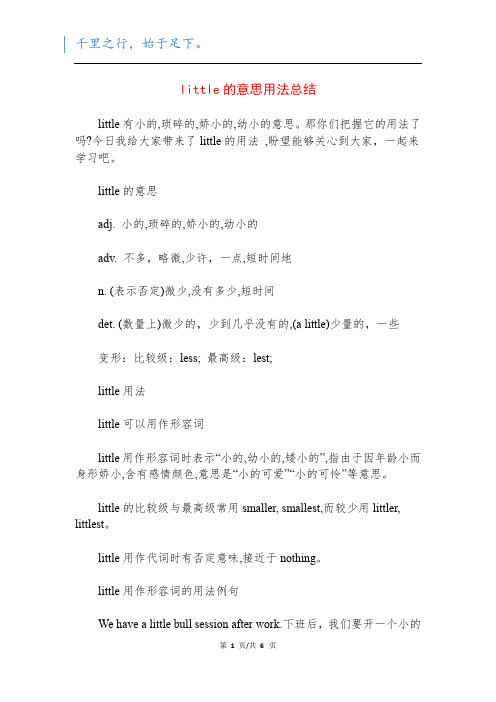
little的意思用法总结little有小的,琐碎的,娇小的,幼小的意思。
那你们把握它的用法了吗?今日我给大家带来了little的用法,盼望能够关心到大家,一起来学习吧。
little的意思adj. 小的,琐碎的,娇小的,幼小的adv. 不多,略微,少许,一点,短时间地n. (表示否定)微少,没有多少,短时间det. (数量上)微少的,少到几乎没有的,(a little)少量的,一些变形:比较级:less; 最高级:lest;little用法little可以用作形容词little用作形容词时表示“小的,幼小的,矮小的”,指由于因年龄小而身形娇小,含有感情颜色,意思是“小的可爱”“小的可怜”等意思。
little的比较级与最高级常用smaller, smallest,而较少用littler, littlest。
little用作代词时有否定意味,接近于nothing。
little用作形容词的用法例句We have a little bull session after work.下班后,我们要开一个小的争论会。
This little bed will do for our youngest daughter.这张小床我们最小的女儿睡能行。
She is too little to ride a bicycle.她太小了,不能骑脚踏车。
little可以用作代词little用作代词时有否定意味,接近于nothing。
the little, a little或little of在句中用作定语时,谓语动词用单数形式。
little可与the连用,用如名词。
little可以用作副词little用作副词和感官的动词连用并放在动词前,表示“毫不”“一点也不”。
当little用作副词置于句首时,句子采纳倒装结构。
little用作副词的用法例句He is little known as an artist.他是个不出名的艺术家。
little用作副词的用法归纳

little用作副词的用法归纳咱们来好好聊聊“little”用作副词的那些事儿。
先跟大家讲讲我之前遇到的一件有趣的小事。
有一次我在公园里散步,看到一个小女孩在努力学骑自行车。
她一次次摔倒,但每次都咬着牙爬起来,嘴里还嘟囔着:“我就不信了,我能学会的,哪怕进步一点点(little)也好。
” 那股子不服输的劲儿真是让人佩服。
在这个场景里,“一点点”就体现了“little”作为副词的用法。
“little”用作副词时,主要有这么几种常见的用法。
第一种,它可以表示“少”“稍许”“略微”。
比如说,“Try to sleep a little ”意思就是“试着多睡一会儿。
”这里的“a little”就表示“一会儿”,强调时间上的短。
再比如,“Can you speak a little louder?” (你能说大声一点儿吗?)这里的“a little”用来修饰比较级“louder”,表示程度上“更响亮一点儿”。
还有哦,“little”单独使用的时候,也能表达否定的意思,相当于“not much”。
像“He knows little about it ”就是说“他对此知道得不多。
”另外,“little”和“by little”搭配在一起,有“逐渐地”的意思。
比如“He improved by little ”(他逐渐进步了。
)咱们再回过头来说说开头那个小女孩学骑自行车的事。
她每次进步虽然只是一点点,但积累起来,最后成功地学会了骑车。
这就像我们学习“little”用作副词的用法一样,每次多掌握一点,慢慢地就能熟练运用啦。
大家在平时的学习和生活中,要多留意“little”的这些用法。
比如读英语文章的时候,看到“little”出现,就琢磨琢磨它在这里是副词吗?是哪种用法呢?做作业的时候,也可以刻意用一用“little”的副词用法。
比如说,描述自己今天的作业完成得“a little better”(好一点儿),或者说自己今天的心情“a little sad”(有点儿难过)。
little和few的区别用法

little和few的区别用法1. “Little”主要用来修饰不可数名词呀,就像“little water”(一点点水)。
你想想,水是不是不可数呀?而“few”呢,则是修饰可数名词,比如“few apples”(几个苹果),苹果是可以一个一个数的嘛,这区别不是很明显吗?2. 哎呀呀,当你想说没多少时间了,可不能用“few time”哦,得用“little time”,这可别搞错啦!就好像你不能把鞋子穿在手上一样呀,它们各有各的用处呀!3. 要是你看到“little money”,那就是说没多少钞票啦,但要是说“few friends”,那就是朋友数量少呀。
这不是挺简单易懂的嘛,难道还会搞混吗?4. 比如说,“There is little hope.”(没什么希望。
)这里用“little”就很恰当呀。
但如果是“There are few people in the room.”(房间里没几个人。
)就得用“few”啦,是不是很神奇呀?5. 你可别小瞧了这“little”和“few”的区别哟,用错了可就闹笑话啦。
就好像你把盐当成糖放进咖啡里,那味道能对吗?6. “Little”和“few”就像是一对性格不同的双胞胎呀,一个管着不可数的,一个管着可数的,多有意思呀!你能不好好记住它们吗?7. 当你想说几乎没有牛奶了,那就是“little milk”;而想说几乎没有书了,就是“few books”啦。
这么一解释是不是清楚多啦?8. 哎呀,如果用错了“little”和“few”,那不就像走路走岔了道一样嘛,得赶紧纠正回来呀。
难道不是吗?9. 仔细想想,“little”和“few”的区别其实很简单呀,抓住不可数和可数这个关键点就好啦。
就像区分白天和黑夜一样容易呀,可别再搞混咯!我的观点结论就是:只要记住“little”修饰不可数,“few”修饰可数,就不会用错啦,很简单的呀!。
little的用法
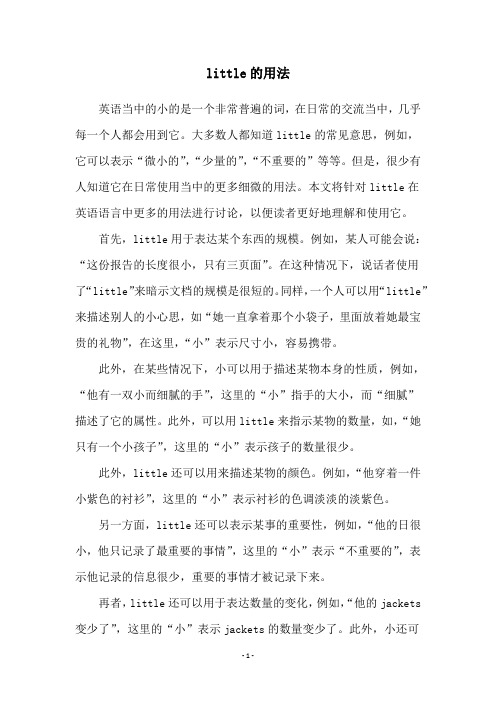
little的用法英语当中的小的是一个非常普遍的词,在日常的交流当中,几乎每一个人都会用到它。
大多数人都知道little的常见意思,例如,它可以表示“微小的”,“少量的”,“不重要的”等等。
但是,很少有人知道它在日常使用当中的更多细微的用法。
本文将针对little在英语语言中更多的用法进行讨论,以便读者更好地理解和使用它。
首先,little用于表达某个东西的规模。
例如,某人可能会说:“这份报告的长度很小,只有三页面”。
在这种情况下,说话者使用了“little”来暗示文档的规模是很短的。
同样,一个人可以用“little”来描述别人的小心思,如“她一直拿着那个小袋子,里面放着她最宝贵的礼物”,在这里,“小”表示尺寸小,容易携带。
此外,在某些情况下,小可以用于描述某物本身的性质,例如,“他有一双小而细腻的手”,这里的“小”指手的大小,而“细腻”描述了它的属性。
此外,可以用little来指示某物的数量,如,“她只有一个小孩子”,这里的“小”表示孩子的数量很少。
此外,little还可以用来描述某物的颜色。
例如,“他穿着一件小紫色的衬衫”,这里的“小”表示衬衫的色调淡淡的淡紫色。
另一方面,little还可以表示某事的重要性,例如,“他的日很小,他只记录了最重要的事情”,这里的“小”表示“不重要的”,表示他记录的信息很少,重要的事情才被记录下来。
再者,little还可以用于表达数量的变化,例如,“他的jackets 变少了”,这里的“小”表示jackets的数量变少了。
此外,小还可以用来指示一个对象的重量,如,“他手中捧着一个小石头”,这里的“小”表示那个石头比较轻。
最后,小还可以用来表达情感上的状态,例如,“他有一个小心情”,这里的“小”表示某人心情不好,可能处在不太开心的状态。
综上所述,小在英语中是一个十分常用的词,它可以用来表达某物的大小、颜色、数量、重要性、重量以及情感状态等各种概念。
此外,它也可以用于表达某物的变化。
little比较级和最高级的用法

little比较级和最高级的用法"Little"是一个形容词,表示"少的,小的",可以用来进行比较和表达最高级。
下面是它的用法:1. Little +比较级+ than:表示与另一事物相比较时更少或更小。
- Tom has little money than his brother. (汤姆的钱比他弟弟少。
)- The blue dress costs little less than the red one. (这件蓝色的连衣裙比那件红色的便宜一点。
)2. The + little +最高级:表示一群事物中最小或最少的。
- Sarah is the littlest girl in the class. (莎拉是班上最小的女孩。
)- This is the littlest amount of sugar you can add to the recipe. (这是你可以在配方中加入的最少量的糖。
)拓展用法:- A little:与"little"相对,表示"一点儿",常用于否定句或疑问句中。
如:"I have a little money."(我有一点儿钱。
)- Little by little:逐渐地,一点一点地。
如:"She is improving little by little in her piano playing."(她的钢琴水平正在逐渐提高。
)需要注意的是,“little”通常用于否定句或疑问句中,表示"少得"或"几乎没有",而不是比较级或最高级的用法。
little的倒装句的用法
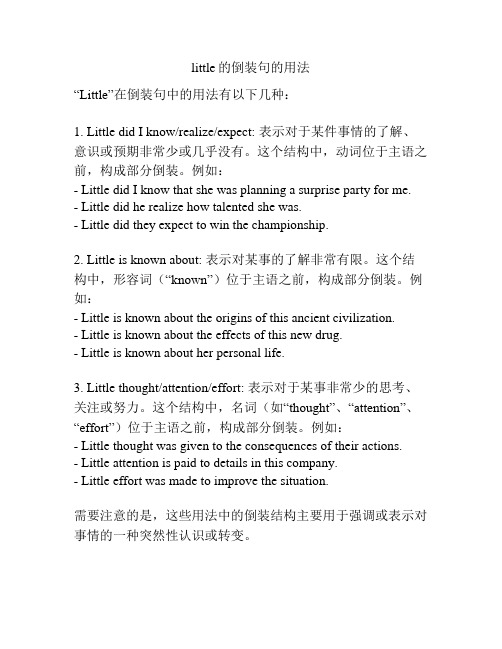
little的倒装句的用法“Little”在倒装句中的用法有以下几种:1. Little did I know/realize/expect: 表示对于某件事情的了解、意识或预期非常少或几乎没有。
这个结构中,动词位于主语之前,构成部分倒装。
例如:- Little did I know that she was planning a surprise party for me. - Little did he realize how talented she was.- Little did they expect to win the championship.2. Little is known about: 表示对某事的了解非常有限。
这个结构中,形容词(“known”)位于主语之前,构成部分倒装。
例如:- Little is known about the origins of this ancient civilization.- Little is known about the effects of this new drug.- Little is known about her personal life.3. Little thought/attention/effort: 表示对于某事非常少的思考、关注或努力。
这个结构中,名词(如“thought”、“attention”、“effort”)位于主语之前,构成部分倒装。
例如:- Little thought was given to the consequences of their actions.- Little attention is paid to details in this company.- Little effort was made to improve the situation.需要注意的是,这些用法中的倒装结构主要用于强调或表示对事情的一种突然性认识或转变。
little的用法

little的用法little有小的;幼小的;短的;微不足道的等意思,那么你知道little的用法吗?下面跟着店铺一起来学习一下,希望对大家的学习有所帮助!little的用法大全:little的用法1:little用作形容词时表示“小的,幼小的,矮小的”,指由于因年龄小而身形娇小,含有感情色彩,意思是“小的可爱”“小的可怜”等意思。
little的用法2:little的比较级与最高级常用smaller, smallest,而较少用littler, littlest。
little的用法3:little习惯上不与large并用,表示“大大小小”可与big或great连用。
little的用法4:little用作代词时有否定意味,接近于nothing。
little的用法5:the little, a little或little of在句中用作定语时,谓语动词用单数形式。
little的用法6:little可与the连用,用如名词。
little的用法7:little用作副词和感官的动词连用并放在动词前,表示“毫不”“一点也不”。
little的用法8:当little用作副词置于句首时,句子采用倒装结构。
little的用法例句:1. It's not about making the amazing saves. It's the little things and small things that made great gatekeepers great.伟大的门将不是靠神奇的扑救成就,而是靠注重小事和细节成功。
(Tim Howard美国国家队门将)2. He could just about see the little man behind the counter.他勉强能看到柜台后面的小个子男人。
3. "I wish I had a little brother," said Daphne wistfully.“我希望有个小弟弟。
little的用法和例句

little的用法和例句一、什么是“little”?“Little” 是一个常见的英文词汇,经常被用作形容词或副词。
作为形容词时,它表示大小、数量或程度上的不多;作为副词时,它表示程度上少或微小。
掌握和正确运用“little”的用法,可以帮助我们更准确地描述事物,并加强句子的表达能力。
在下面的文章中,将介绍“little”的不同用法和配以例句来加深理解。
二、作为形容词的“little”1. 表示大小或数量有限:当我们需要描述一个物体比较小或数量较少时,“little”可以起到形容的作用。
- There is a little bird sitting on the branch.(树枝上有只小鸟坐着)- I have only a little money left in my wallet.(我钱包里只剩下一点点钱了)2. 表示程度轻微:除了表示大小或数量有限外,“little”也可以描述某种状态或行动在程度方面较轻微。
- He felt a little upset after hearing the news. (他听到那个消息后感到有点心烦意乱)- This car has a little damage, but it can still be driven. (这辆车有些损坏,但还能开)3. 表示亲密或熟悉:此外,作为形容词,“little”还可以表示某种亲密或熟悉的关系。
- Tom is her little brother. (汤姆是她的小弟弟)- She treated me like a little sister.(她把我当做小妹妹一样对待)三、作为副词的“little”1. 表示少量:作为副词时,“little”用来形容动作或状态上的少量。
- She eats very little these days. (最近她吃得很少)- He spoke very little during the meeting. (在会议期间他说得很少)2. 表示缺乏:除了表示少量以外,“little”也可以表示某事物缺乏或不充足。
little的意思用法总结

little的意思用法总结
little是一个形容词,可以表示三种不同的含义:
1. 小的,不大的:指尺寸、数量、程度小:
- She has a little house in the countryside.(她在乡村有一所小房子。
)
- I have little time to finish the project.(我没有多少时间完成这个项目。
)
2. 幼小的,年龄小的:用来描述年龄较小的孩子:
- Mary is a little girl.(玛丽是个小女孩。
)
- The little boy is playing in the garden.(小男孩在花园里玩。
)
3. 微不足道的,不重要的:用来表示事物的重要性或价值程度有限:
- The book was of little importance to me.(这本书对我来说不太重要。
) - He paid little attention to my advice.(他对我的建议不太在意。
)
此外,little还可以作为副词使用,表示程度很低:
- He knows little about art.(他对艺术知之甚少。
)
- I can speak little Spanish.(我只会很少的西班牙语。
)。
little的用法

little的用法
little是一个形容词,意思是小的、微不足道的,在表示数量的时候可以表示“很少的”。
这个词可以用在名词前面形成“little+名词”的短语。
它也可以用在句子中作独
立的一个副词。
1.little在表示数量时,意为“很少”。
We don't get many visitors,just a little。
我们收到的访客很少,只是一点点。
2.表示“很少”时,前面通常有定冠词或不定冠词。
她懂得一点儿中文。
成功的机会很少。
3.在表示占比时,可以用“a little”也可以用“few”代替,表示不及部分的含义。
我们拥有少数海外会员。
4.little还可以表示极其少或微弱的事物,表达有限的意思。
公司活下去的希望渺茫。
1.独立的作为副词使用
The customer service was very bad but no one said anything about it,
little did we know that the manager was aware of the problem。
客服服务非常糟糕,但是没有人提出过任何不满,我们就只知道小小的事,而不知道
经理已经意识到了这个问题。
2.little作形容词在名词前使用,表示“小的”
This is a little shop。
这是个小店铺。
这是一点小小的成功。
别担心,不会有太大的变化。
little的用法
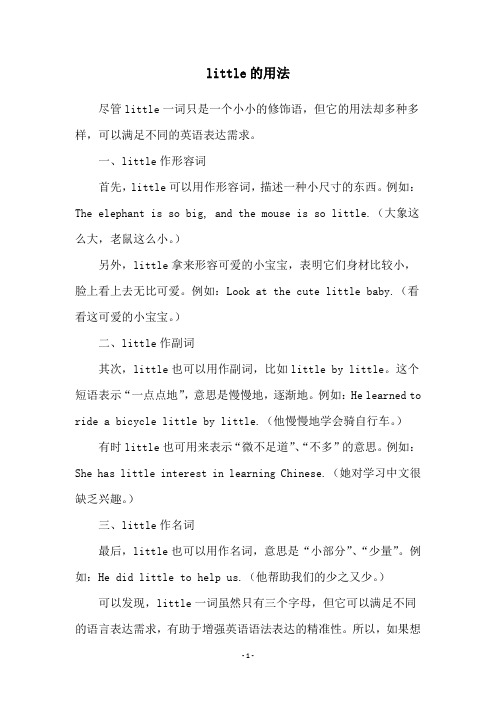
little的用法
尽管little一词只是一个小小的修饰语,但它的用法却多种多样,可以满足不同的英语表达需求。
一、little作形容词
首先,little可以用作形容词,描述一种小尺寸的东西。
例如:The elephant is so big, and the mouse is so little.(大象这么大,老鼠这么小。
)
另外,little拿来形容可爱的小宝宝,表明它们身材比较小,脸上看上去无比可爱。
例如:Look at the cute little baby.(看看这可爱的小宝宝。
)
二、little作副词
其次,little也可以用作副词,比如little by little。
这个短语表示“一点点地”,意思是慢慢地,逐渐地。
例如:He learned to ride a bicycle little by little.(他慢慢地学会骑自行车。
)有时little也可用来表示“微不足道”、“不多”的意思。
例如:She has little interest in learning Chinese.(她对学习中文很缺乏兴趣。
)
三、little作名词
最后,little也可以用作名词,意思是“小部分”、“少量”。
例如:He did little to help us.(他帮助我们的少之又少。
)可以发现,little一词虽然只有三个字母,但它可以满足不同的语言表达需求,有助于增强英语语法表达的精准性。
所以,如果想
做到用词准确,最好还是多多熟悉little的用法。
little的意思用法总结

little的意思用法总结
1. 小的:little可以表示大小上的小,例如a little dog(小狗),a little house(小房子)。
2. 少的:little也可以表示数量上的少,例如a little money(少量的钱),a little knowledge(一点知识)。
3. 幼小的:little还可以指代幼小的人或动物,例如little children(小孩子),little baby(小宝宝)。
4. 稍微的:little可以表示程度上稍微的,例如a little tired(稍微累了),a little bit hot(有点热)。
5. 不重要的:little有时也被用来表示不重要的,例如a little problem(小问题),a little mistake(小错误)。
6. 没有:little还可以表示没有,在否定句中常用于修饰不可数名词,例如There is little hope(几乎没有希望),I have little time(我没有时间)。
7. 简直不:little加上not构成little not,表示简直不,例如little did she know(她简直不知道),little did they care(他们简直不在乎)。
总之,little作为形容词一般表示小的、少的、幼小的等含义,作为副词一般表示稍微的、简直不等含义。
同时,little还可以用于否定句中表示没有。
little例句
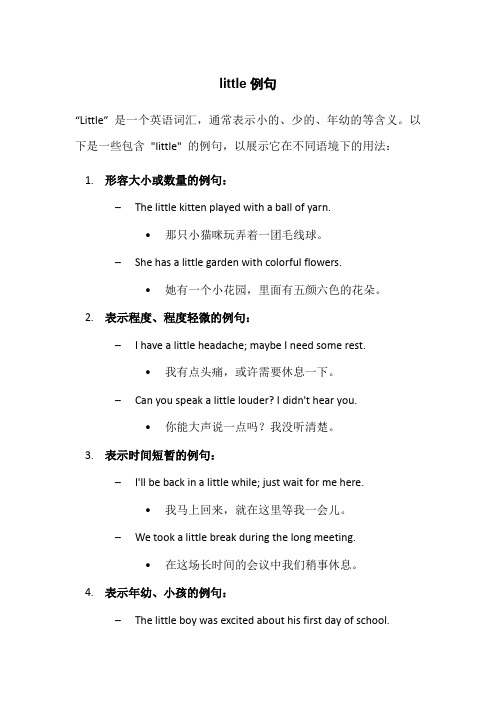
little例句“Little” 是一个英语词汇,通常表示小的、少的、年幼的等含义。
以下是一些包含"little" 的例句,以展示它在不同语境下的用法:1.形容大小或数量的例句:–The little kitten played with a ball of yarn.•那只小猫咪玩弄着一团毛线球。
–She has a little garden with colorful flowers.•她有一个小花园,里面有五颜六色的花朵。
2.表示程度、程度轻微的例句:–I have a little headache; maybe I need some rest.•我有点头痛,或许需要休息一下。
–Can you speak a little louder? I didn't hear you.•你能大声说一点吗?我没听清楚。
3.表示时间短暂的例句:–I'll be back in a little while; just wait for me here.•我马上回来,就在这里等我一会儿。
–We took a little break during the long meeting.•在这场长时间的会议中我们稍事休息。
4.表示年幼、小孩的例句:–The little boy was excited about his first day of school.•那个小男孩对他的第一天上学感到兴奋。
–She has two little daughters, both under the age of five.•她有两个小女儿,都不到五岁。
5.用于比较的例句:–This book is a little more challenging than the one I read before.•这本书比我之前读的那本稍微有些难度。
–Your car is a little faster than mine.•你的车比我的快一点。
little的用法

little的用法little用法在英语中非常普遍,它可以用作形容词、代词以及副词。
本文将从以下三个方面来详细讨论 little用法:一、Little 作形容词的用法当作形容词时,little用来修饰名词,表示“少量的、微小的”之意,例如:I have little money left.我只剩下很少的钱了。
He has a little knowledge about the subject.他对这个课题知之甚少。
另外,在英语口语中,little可以表示“没有太多”的意思,例如:We have little choice but to accept her offer 除了接受她的提议外,我们别无选择。
也可以用来表达“不太重要”的意思,例如:It of little consequence whether he comes or not.他来与不来没有多大关系。
二、Little 作代词的用法Little 作代词的用法主要有以下两种:1、Little作人称代词,表示“小的、微不足道的(尤指有礼貌地表示)”,例如:Little can be done to make him change his mind.要让他改变主意几乎不可能。
2、Little 也可表示“没什么”的意思,例如:I don care about this, little use does it make for me.我对此不以为然,对我来说也没什么用处。
三、Little 作副词的用法Little 作副词时,可表示“不多、不太、不充分”的意思。
例如:He works little and plays much.他不怎么工作而玩得很多。
Little did I expect that he would be so successful.我没料到他会如此成功。
另外,也可以用来表示“小心地、程度轻微地”,例如:Little by little he became more confident.他一点点地变得更有信心了。
little 名词 代词的用法
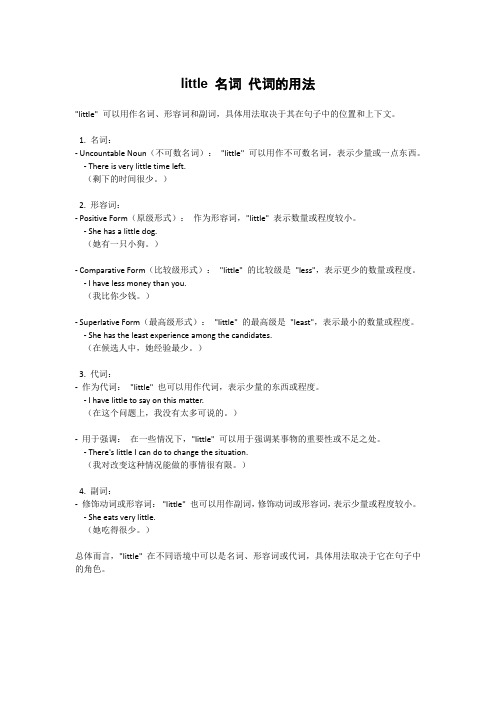
little 名词代词的用法"little" 可以用作名词、形容词和副词,具体用法取决于其在句子中的位置和上下文。
1. 名词:- Uncountable Noun(不可数名词):"little" 可以用作不可数名词,表示少量或一点东西。
- There is very little time left.(剩下的时间很少。
)2. 形容词:- Positive Form(原级形式):作为形容词,"little" 表示数量或程度较小。
- She has a little dog.(她有一只小狗。
)- Comparative Form(比较级形式):"little" 的比较级是"less",表示更少的数量或程度。
- I have less money than you.(我比你少钱。
)- Superlative Form(最高级形式):"little" 的最高级是"least",表示最小的数量或程度。
- She has the least experience among the candidates.(在候选人中,她经验最少。
)3. 代词:-作为代词:"little" 也可以用作代词,表示少量的东西或程度。
- I have little to say on this matter.(在这个问题上,我没有太多可说的。
)-用于强调:在一些情况下,"little" 可以用于强调某事物的重要性或不足之处。
- There's little I can do to change the situation.(我对改变这种情况能做的事情很有限。
)4. 副词:-修饰动词或形容词:"little" 也可以用作副词,修饰动词或形容词,表示少量或程度较小。
little的用法
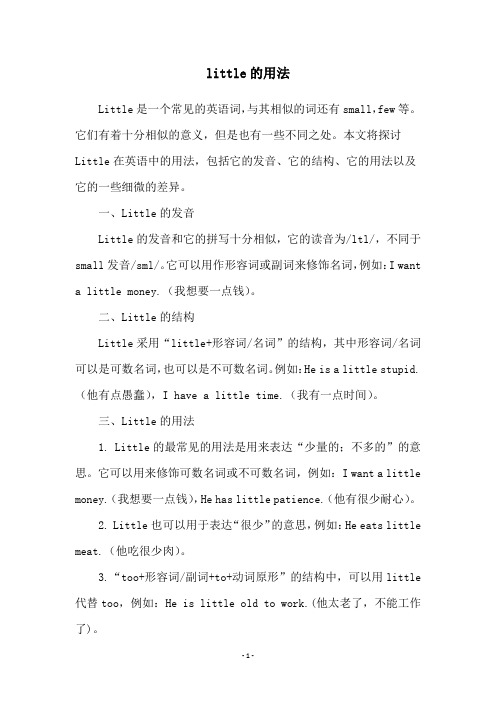
little的用法Little是一个常见的英语词,与其相似的词还有small,few等。
它们有着十分相似的意义,但是也有一些不同之处。
本文将探讨Little在英语中的用法,包括它的发音、它的结构、它的用法以及它的一些细微的差异。
一、Little的发音Little的发音和它的拼写十分相似,它的读音为/ltl/,不同于small发音/sml/。
它可以用作形容词或副词来修饰名词,例如:I wanta little money.(我想要一点钱)。
二、Little的结构Little采用“little+形容词/名词”的结构,其中形容词/名词可以是可数名词,也可以是不可数名词。
例如:He is a little stupid.(他有点愚蠢),I have a little time.(我有一点时间)。
三、Little的用法1. Little的最常见的用法是用来表达“少量的;不多的”的意思。
它可以用来修饰可数名词或不可数名词,例如:I want a little money.(我想要一点钱),He has little patience.(他有很少耐心)。
2. Little也可以用于表达“很少”的意思,例如:He eats little meat.(他吃很少肉)。
3.“too+形容词/副词+to+动词原形”的结构中,可以用little 代替too,例如:He is little old to work.(他太老了,不能工作了)。
4. Little也可以用于表达“有点”的意思,例如:He is a little foolish.(他有点愚蠢)。
四、Little与small的区别Little和small在语义上没有太大的区别,但是他们的用法有一些细微的差异:1. Little主要用于实义动词之前,而small则可以放在实义动词和谓语动词之前,例如:She has a little cake.(她有一小块蛋糕),The cake is small.(蛋糕很小)。
little的用法
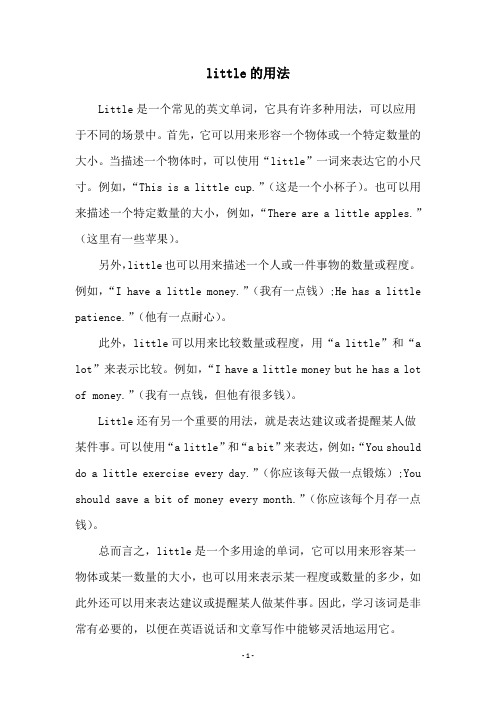
little的用法
Little是一个常见的英文单词,它具有许多种用法,可以应用于不同的场景中。
首先,它可以用来形容一个物体或一个特定数量的大小。
当描述一个物体时,可以使用“little”一词来表达它的小尺寸。
例如,“This is a little cup.”(这是一个小杯子)。
也可以用来描述一个特定数量的大小,例如,“There are a little apples.”(这里有一些苹果)。
另外,little也可以用来描述一个人或一件事物的数量或程度。
例如,“I have a little money.”(我有一点钱);He has a little patience.”(他有一点耐心)。
此外,little可以用来比较数量或程度,用“a little”和“a lot”来表示比较。
例如,“I have a little money but he has a lot of money.”(我有一点钱,但他有很多钱)。
Little还有另一个重要的用法,就是表达建议或者提醒某人做某件事。
可以使用“a little”和“a bit”来表达,例如:“You should do a little exercise every day.”(你应该每天做一点锻炼);You should save a bit of money every month.”(你应该每个月存一点钱)。
总而言之,little是一个多用途的单词,它可以用来形容某一物体或某一数量的大小,也可以用来表示某一程度或数量的多少,如此外还可以用来表达建议或提醒某人做某件事。
因此,学习该词是非常有必要的,以便在英语说话和文章写作中能够灵活地运用它。
little的用法

little的用法
Little一词具有各种含义,因此可以有多种用法。
首先,对小孩来说,little可以用在口语中表示爱称,例如“小宝宝”、“小鬼”、“小猪仔”等等。
这样的语言表达多种情感,既可以表达对孩子的爱,也可以表达出对孩子的宽容、慈悲之心。
其次,little也可以表示少量、程度次之,例如“little effort (少量努力)”、“a little bit(一点点)”等等,表明对事物的评价不是很高,认为其不太优秀或不太重要。
此外,little也可表示一定的贬义,表达情感上的轻蔑、嫌弃之意,例如“a little man(一个小人物)”,含有蔑视的意思。
再次,little也可以用来表示狭义的概念,例如“a little joke (一个小笑话)”,指的是短小的笑话;“a little water(一点点水)”,指的是少量的水。
最后,little还可以表示贬义的成语,例如“a little respect (一点尊重)”、“a little bit of thought(一点思考)”等,表明缺乏思考或顾及他人感受等情绪。
总之,little一词可以根据不同的场合、情境有不同的用法,不但可以用在口语中,也可以在写作中使用,以便更好地抒发出自己说话时所表现的意思。
- 1 -。
- 1、下载文档前请自行甄别文档内容的完整性,平台不提供额外的编辑、内容补充、找答案等附加服务。
- 2、"仅部分预览"的文档,不可在线预览部分如存在完整性等问题,可反馈申请退款(可完整预览的文档不适用该条件!)。
- 3、如文档侵犯您的权益,请联系客服反馈,我们会尽快为您处理(人工客服工作时间:9:00-18:30)。
few, a few, little, a little虽然都表示“少”,但(1)few, a few是可数的, little, a little是不可数的。
(2)a few, a little含肯定意味,few, little含否定意味。
这里所谓的“肯定意味”和“否定意味”应该这样来理解:同样是半杯水,口渴者会认为:There is little water in the glass. 而不口渴的人则会认为:There is a little water in the glass. 一:1.few修饰可数名词复数。
2.few (= not many; hardly any)含否定意义;a few (= some; several; a small umber of) 含肯定意义。
3.词组not a few = no few = quite a few = a good few = many quite a few=many(修饰可数名词)表示“许多”quite a little=much(修饰不可数名词)表示“许多。
4.当few受every, last, past, next, some, very等词所修饰时,表示肯定意义,few之前不再有冠词。
如:In the last few minutes, he checked up his paper again.It took us some few days to repair the machine.二:1.little修饰不可数名词,表示“量”。
2.little含否定意义(反义词:much);a little含肯定意义(反义词:none)。
3.在非正式英语中,一般很少用little,常用not much, only a little来代替,如:We haven’t got much money / timea lot of, 相当于much,more的化身,但仅用于修饰名词,当后面接形容词比较级时,应为a lot;例:There is a lot of water in the tank;There'are a lot of books in my room;I'm a lot better now, thanks.more, 为much和many的比较级,后接名词(可数或不可数均可),或形容词;例:I have more books than him.I have more coffee than him;The book is more expensive.many, much, a lot of, lots of, plenty of表示"多"的意思,可用many, much, a lot of, lots of, plenty of等。
(1)many, much常用于否定句和疑问句,而a lot of等则常用于肯定句。
例如:I haven't seen many English films. 多数英文电影我没看过。
many修饰可数名词Have you seen many English films? 多数的英文电影你都看过吗?many修饰可数名词I haven't done much work today. 我还没有做多少活呢。
much修饰不可数名词Have you done much work today? 今天你已经做了很多活吗?much修饰不可数名词I have seen a lot of / lots of / plenty of / a great number of English films.我已经看了多部英文电影。
number修饰可数名词I have done a lot of / lots of / plenty of / a great amount of work today.今天我已经做了很多活。
amount修饰不可数名词(2) many / much 既可作限定词,也可作不定代词(INDEFINITE PRONOUN〕,a lot 也可单独用作名词词组:Have you done all these exercises?----No, I haven't done very many.Have you done much work today?----Yes, I've done a lot.(3) 当然,以上所讲many / much常用于否定句和疑问句并不是绝对的,尤其是在下列场合many / much也常用于肯定句:a) 用于whether / if引导的宾语分句中。
例如:I doubt whether / if there'll be many people at the show on this rainy day. 我怀疑在这个雨天里会有很多人看表演。
I wonder whether / if he has much information on this subject. 我想知道在这个题目上他是否知道很多消息。
b) 用于由"how / too / so / as+ many / much (+中心词)" 构成的名词词组中。
例如:He took so many boxes with himthat he had to call a taxi.他身边带着太多的箱子,不得不叫计程车。
It's really surprising that the child has so much strength at his age.真是很惊奇,在这个年龄的孩子居然这么有力气。
You can take as many copies as you need. 你可以根据你的需要想拿多少张就拿多少张。
You can use as much oil as you need. 根据你的需要想用多少油就用多少。
I have (far) too many books on the shelf.We've had too much rain this spring. 这个春天我们已经有太多的雨。
I'd like to know how many copies are needed for the class.我想要知道在这班需要多少张考贝。
I want to know how much money will be spent on the project.我想知道将在这个计划花费多少钱。
MUCH修饰不可数名词MONEY。
c) 用于在句首作主语以及在"存在句"中作实义主语的名词词组中。
例如:Many people would like to take holidays abroad. 许多人喜欢去国外渡假。
Much coal has been saved through the use of the new device. 通过用新的装置,很多煤被节省下来。
There are many girl students in my class. 在我的班级里有许多女学生。
There is much coal left in the mine. 在煤矿有很多的煤剩下。
同样地,a good / great many也可用于肯定句。
例如:I have read a great many English novels. 我已读过大量的英语小说。
few, (a)little(1)表示"少"的意思,可用(a) few, (a) little, 既可用作限定词,也可用作不定代词。
a few, a little表示"少量",带有肯定意义。
例如:Let's invite a few friends to come with us.让我们来邀请几个朋友来和我们在一起。
Here are a few more books on this subject. 在他的课题上有少量的书。
There are only a very few left. 只有一点点剩下。
I'm keeping the few that remain for tomorrow. 我保住剩下的一点点为明天。
I had a little difficulty in solving the problem. 在解决这个问题上我有一点困难。
Give me a little of that wine. 给我一点那种酒。
I'm trying to use the little French I have just learnt. 我正在试用我刚学的一点法语。
(2)few / little 若不与a 连用则表示否定意义,相当于not many / much, not enough。
例如:I have very few (chocolates) left. 我剩下不多的巧克力。
Few (children) were tired. 很少的学生累了。
I have very little (money) left. 我有为数不多的钱剩下。
I understood little of his speech. 他的演讲我懂一点点。
要注意,quite a few, a good few. not a few不表示"少",而表示"相当多"的含义,相当于, a fair number (of)。
例如:Quite a few of us are getting worried. 我们相当多的人正在担心。
You'll have to wait a good few weeks. 你将不得不等上相当多个星期。
little 的比较级和最高级是less 和least, 通常只能用与不可数名词搭配,但在当代英语中也有用less与复数搭配的。
例如:If only there were less holes in the roof. 如果房顶仅是少量洞。
但这只见于非正式主体;在正式主体中仍用fewer较少,为好。
词组:not a few = no few = quite a few = a good few = many(3)当few受every, last, past, next, some, very等词所修饰时,表示肯定意义,few之前不再有冠词。
如:(同(2))In the last few minutes, he checked up his paper again.It took us some few days to repair the machine.A great deal of 用法详解a great deal可单独使用,也可以用在形容词或副词的比较级前,表示“大量;许多”;而a great deal of只能用在不可数名词前,表示“大量的”。
